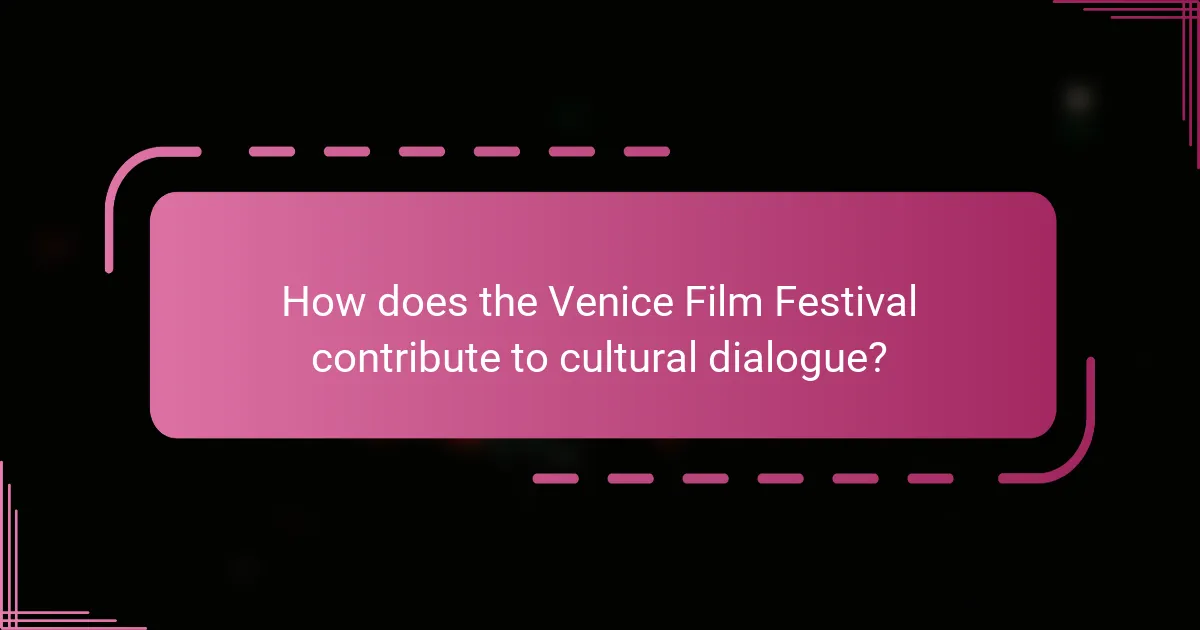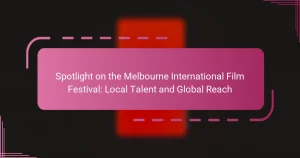The Venice Film Festival is an annual event in Venice, Italy, recognized as one of the oldest film festivals, established in 1932. It is part of the Venice Biennale and showcases a diverse array of films from around the world, awarding the prestigious Golden Lion for best film. The festival plays a significant role in cultural dialogue by promoting underrepresented narratives and addressing social issues through cinema. It fosters international collaboration among filmmakers and industry professionals, contributing to a vibrant exchange of ideas. The future of the Venice Film Festival looks promising, with increasing attendance and a commitment to innovation and inclusivity in film.

What is the Venice Film Festival?
The Venice Film Festival is an annual film festival held in Venice, Italy. It is one of the oldest film festivals in the world, established in 1932. The festival is part of the Venice Biennale, a major cultural event. It showcases new films from around the globe. The festival awards the prestigious Golden Lion for best film. It attracts filmmakers, actors, and industry professionals. The Venice Film Festival significantly influences global cinema trends. It serves as a platform for artistic expression and innovation in filmmaking.
How did the Venice Film Festival originate?
The Venice Film Festival originated in 1932 as a means to promote international cinema. It was initiated by the Venice Biennale, an organization dedicated to contemporary art. The first festival showcased 22 films, attracting significant attention. The event aimed to foster cultural exchange and celebrate the art of filmmaking. Over the years, it has grown into one of the most prestigious film festivals globally. The festival has played a crucial role in launching the careers of many filmmakers. It also introduced the Golden Lion award, which honors the best film. The Venice Film Festival continues to influence the film industry today.
What historical context led to the establishment of the Venice Film Festival?
The Venice Film Festival was established in 1932 as part of the Venice Biennale. It aimed to promote international cinema and foster cultural exchange. The festival emerged during a time of significant political and social change in Europe. The rise of fascism and the impact of the Great Depression influenced artistic expressions. The festival provided a platform for filmmakers to showcase their work amid these challenges. The first edition featured 21 films, highlighting the importance of cinema in society. This historical context underscores the festival’s role in shaping film culture. Its establishment marked a new era for the film industry, emphasizing artistic innovation and global collaboration.
Who were the key figures involved in founding the festival?
The key figures involved in founding the Venice Film Festival include Luigi Freddi and Count Giuseppe Volpi di Misurata. Luigi Freddi was the director of the Venice Biennale and played a crucial role in establishing the festival in 1932. Count Giuseppe Volpi di Misurata was the president of the Biennale at the time and supported the initiative. Together, they aimed to promote Italian cinema and celebrate international films. Their collaboration laid the foundation for what would become the world’s oldest film festival.
What is the significance of the Venice Film Festival in the film industry?
The Venice Film Festival is significant in the film industry as it is one of the oldest film festivals in the world. Established in 1932, it plays a crucial role in showcasing international cinema. The festival serves as a prestigious platform for filmmakers to premiere their works. It often influences awards season, with many films gaining recognition at subsequent events. The Golden Lion, awarded at the festival, is highly coveted. Additionally, the festival promotes cultural exchange and artistic innovation. It attracts global media attention, impacting box office success. Historical premieres, such as “La Dolce Vita” in 1960, highlight its importance in cinematic history.
How does the festival influence film trends and industry standards?
The Venice Film Festival influences film trends and industry standards by showcasing innovative storytelling and diverse cinematic styles. It serves as a platform for emerging filmmakers and avant-garde projects. The festival often highlights socially relevant themes, setting trends that resonate throughout the industry. Historical examples include the introduction of new genres and narrative techniques, such as neorealism in the 1940s. Award winners frequently gain critical acclaim, impacting future productions and distribution strategies. The festival’s red carpet and awards also dictate marketability and audience expectations. This influence is evident in the rising prominence of international films in mainstream cinema. Overall, the Venice Film Festival shapes the creative landscape and industry benchmarks significantly.
What role does the festival play in promoting international cinema?
The festival plays a crucial role in promoting international cinema by providing a global platform for filmmakers. It showcases diverse films from various countries, enhancing cultural exchange. The Venice Film Festival attracts international audiences and industry professionals, fostering networking opportunities. It helps lesser-known filmmakers gain visibility and recognition. Historical data shows that award-winning films often gain international distribution after premiering at the festival. This exposure can lead to increased funding and collaboration across borders. Overall, the festival significantly influences the global cinematic landscape.
What are some iconic moments in Venice Film Festival history?
The Venice Film Festival has witnessed several iconic moments throughout its history. In 1951, it became the first film festival to award a Golden Lion for best film. This marked the beginning of its prestigious reputation in the film industry. In 1970, the festival featured the controversial film “The Conformist,” which sparked discussions about censorship and artistic freedom.
In 1980, the festival honored the legendary filmmaker Federico Fellini with a retrospective of his works. This celebration highlighted his significant contributions to cinema. The 2006 festival was notable for the premiere of “Babel,” which went on to receive critical acclaim and multiple awards.
In 2012, the festival showcased the film “The Master,” directed by Paul Thomas Anderson, which generated buzz for its performances and themes. The 2019 festival made headlines when “Joker” received the Golden Lion, emphasizing the shift in genre recognition at major festivals. These moments reflect the festival’s impact on cinema and its role in shaping cultural conversations.
Which films have premiered at the festival and gained critical acclaim?
Several films have premiered at the Venice Film Festival and gained critical acclaim. Notable examples include “La Dolce Vita,” directed by Federico Fellini, which won the Palme d’Or in 1960. “The Last Emperor,” directed by Bernardo Bertolucci, received nine Academy Awards after its premiere in 1987. “Birdman,” directed by Alejandro González Iñárritu, won the Golden Lion in 2014 and later secured four Oscars. “Roma,” directed by Alfonso Cuarón, premiered in 2018 and received three Academy Awards, including Best Director. These films exemplify the festival’s role in showcasing cinematic excellence and influencing global cinema.
What memorable events or speeches have taken place at the festival?
Memorable events at the Venice Film Festival include the debut of groundbreaking films and impactful speeches. In 1970, the festival featured the premiere of “The Conformist,” which sparked significant discussions on political themes. In 2018, Lady Gaga delivered a heartfelt speech about the importance of mental health during her film’s presentation. Additionally, the festival often honors lifetime achievements, with notable speeches from acclaimed filmmakers like Martin Scorsese. The festival also serves as a platform for social issues, exemplified by the 2019 speech from the cast of “Joker,” addressing mental health awareness. Each of these moments contributes to the festival’s legacy as a cultural touchstone in the film industry.

How does the Venice Film Festival contribute to cultural dialogue?
The Venice Film Festival contributes to cultural dialogue by showcasing diverse cinematic voices from around the world. It serves as a platform for filmmakers to present stories that reflect various cultural perspectives. The festival encourages discussions on social issues depicted in films. It fosters international collaboration among artists and industry professionals. Additionally, it highlights underrepresented narratives, promoting inclusivity in cinema. Historical context shows that the festival has featured films addressing critical global topics, such as human rights and environmental issues. This engagement stimulates conversations among audiences, critics, and filmmakers alike. Thus, the Venice Film Festival plays a vital role in enhancing cultural exchange and understanding through film.
In what ways does the festival showcase diverse cultures?
The Venice Film Festival showcases diverse cultures through its international film selection. It features films from various countries, highlighting unique storytelling traditions. The festival includes panels and discussions with filmmakers from around the world. This encourages cultural exchange and dialogue among attendees. Additionally, the event celebrates films in multiple languages, reflecting global perspectives. Cultural exhibitions and performances complement the film screenings. These elements create an immersive cultural experience for visitors. The festival’s awards recognize excellence in diverse cinematic expressions.
How are films selected to represent different cultural narratives?
Films are selected to represent different cultural narratives through a combination of artistic merit, cultural significance, and thematic relevance. Selection committees evaluate submissions based on how well they reflect the diversity of cultural experiences. They consider the historical and social context of the narratives presented. The Venice Film Festival, for instance, aims to showcase films that highlight underrepresented voices. This approach fosters cross-cultural dialogue and understanding. Furthermore, films that challenge stereotypes or offer fresh perspectives are prioritized. The festival’s commitment to inclusivity enhances its role in cultural representation.
What impact does the festival have on global cultural exchange?
The Venice Film Festival significantly enhances global cultural exchange. It showcases films from diverse countries, promoting international storytelling. The festival attracts filmmakers, actors, and audiences worldwide. This convergence fosters dialogue and collaboration across cultures. Additionally, it introduces global audiences to unique cultural narratives. The festival’s awards often spotlight films that challenge cultural norms. This recognition encourages filmmakers to explore innovative themes. Ultimately, the Venice Film Festival serves as a vital platform for cultural diplomacy and understanding.
Why is the Venice Film Festival important for filmmakers?
The Venice Film Festival is important for filmmakers because it serves as a prestigious platform for showcasing new films. Established in 1932, it is one of the oldest film festivals in the world. The festival attracts influential industry figures, including directors, producers, and critics. Winning awards at Venice can significantly enhance a filmmaker’s career. The Golden Lion, awarded for best film, is highly coveted and recognized globally. Furthermore, the festival provides filmmakers with exposure to international audiences. It also fosters networking opportunities that can lead to future collaborations. Overall, the Venice Film Festival plays a crucial role in the global film landscape.
What opportunities does the festival provide for emerging filmmakers?
The Venice Film Festival provides various opportunities for emerging filmmakers. It offers a platform for showcasing their work to a global audience. Filmmakers can gain exposure to industry professionals, critics, and potential investors. The festival features awards that can enhance a filmmaker’s reputation and career prospects. Networking events allow filmmakers to connect with peers and established figures in the industry. Additionally, workshops and panels provide educational resources and insights into the filmmaking process. The festival’s international visibility can lead to distribution deals and collaborations. Overall, participation can significantly impact an emerging filmmaker’s trajectory in the film industry.
How does participation in the festival enhance a filmmaker’s career?
Participation in the festival enhances a filmmaker’s career by providing visibility and networking opportunities. Filmmakers showcase their work to industry professionals and audiences. This exposure can lead to distribution deals and funding for future projects. Festivals often attract media attention, increasing a filmmaker’s profile. Awards won at festivals can validate a filmmaker’s talent and attract further opportunities. For instance, many successful directors gained recognition through their festival screenings. The Venice Film Festival, being prestigious, can significantly elevate a filmmaker’s standing in the industry. Participation can also foster collaborations with other creatives and industry leaders.

What are the future prospects for the Venice Film Festival?
The future prospects for the Venice Film Festival appear promising. The festival continues to attract global attention and participation. Its historical significance enhances its appeal in the film industry. Recent years have shown an increase in attendance and submissions. The festival’s commitment to showcasing diverse films is a positive trend. Additionally, partnerships with streaming platforms expand its reach. The Venice Film Festival’s reputation for innovation keeps it relevant. Overall, these factors suggest a bright future ahead.
How is the festival adapting to changes in the film industry?
The Venice Film Festival is adapting to changes in the film industry by incorporating digital platforms. It has expanded its online presence to reach wider audiences. The festival now offers virtual screenings alongside traditional in-person events. This hybrid model accommodates filmmakers and viewers affected by travel restrictions. Additionally, the festival is emphasizing diversity in film selection. It actively showcases underrepresented voices and genres. Recent years have seen an increase in international participation. This shift reflects the evolving global landscape of cinema. The festival’s initiatives align with industry trends towards inclusivity and accessibility.
What innovations has the festival introduced in recent years?
The Venice Film Festival has introduced several innovations in recent years. It has implemented a digital platform for virtual screenings. This allows wider access for audiences unable to attend in person. The festival has also introduced an online voting system for audience awards. This enhances audience engagement and participation. Additionally, the festival has expanded its focus on sustainability initiatives. This includes eco-friendly practices in event management. Furthermore, the introduction of new categories highlights diverse storytelling. These innovations reflect the festival’s commitment to evolving with the industry.
How does the festival plan to engage with new audiences moving forward?
The festival plans to engage with new audiences through enhanced digital outreach. This includes leveraging social media platforms to share exclusive content. The festival will also offer virtual screenings to reach a global audience. Collaborations with influencers will help attract younger viewers. Interactive online events will create a sense of community. The festival aims to diversify its programming to appeal to various demographics. These strategies are designed to foster greater inclusivity and participation. Recent studies show that digital engagement significantly increases audience reach and involvement.
What tips can filmmakers and attendees consider for the Venice Film Festival?
Filmmakers and attendees at the Venice Film Festival should prioritize networking opportunities. Engaging with industry professionals can lead to collaborations. Attendees should arrive early to secure good seating for screenings. This ensures a better viewing experience and access to Q&A sessions. Filmmakers should prepare concise pitches for their projects. This clarity can attract interest from potential investors or distributors. Participants should familiarize themselves with the festival schedule. Knowing key events helps in planning attendance effectively. Lastly, embracing the festival’s cultural atmosphere enriches the overall experience. The Venice Film Festival is renowned for its unique blend of cinema and art.
How can filmmakers effectively present their work at the festival?
Filmmakers can effectively present their work at the festival by ensuring high-quality production and clear messaging. They should focus on creating engaging visuals and sound that resonate with the audience. Developing a compelling narrative is crucial for capturing attention. Filmmakers must also prepare for Q&A sessions to engage with viewers. Networking with industry professionals can enhance visibility and opportunities. Utilizing social media to promote their work before and during the festival can increase audience turnout. According to a study by the European Audiovisual Observatory, festivals significantly boost film visibility and distribution opportunities.
What should attendees know to maximize their experience at the festival?
Attendees should plan their schedule in advance to maximize their experience at the Venice Film Festival. Knowing the screening times and locations is essential. Familiarizing themselves with the film lineup helps in making informed choices. Arriving early ensures good seating for popular screenings. Networking opportunities abound; attendees should engage with filmmakers and other industry professionals. Being open to spontaneous events can enhance the experience. Utilizing the festival app provides real-time updates and information. Lastly, embracing the cultural atmosphere of Venice enriches the overall experience.
The Venice Film Festival is a prestigious annual event held in Venice, Italy, known for being one of the oldest film festivals globally, established in 1932. The festival showcases international cinema, awards the Golden Lion for best film, and significantly influences film trends and industry standards. Key historical moments, such as the introduction of groundbreaking films and impactful speeches, highlight its cultural impact and role in promoting diverse narratives. The festival continues to adapt to industry changes, providing opportunities for emerging filmmakers while engaging with global audiences through innovative approaches.


